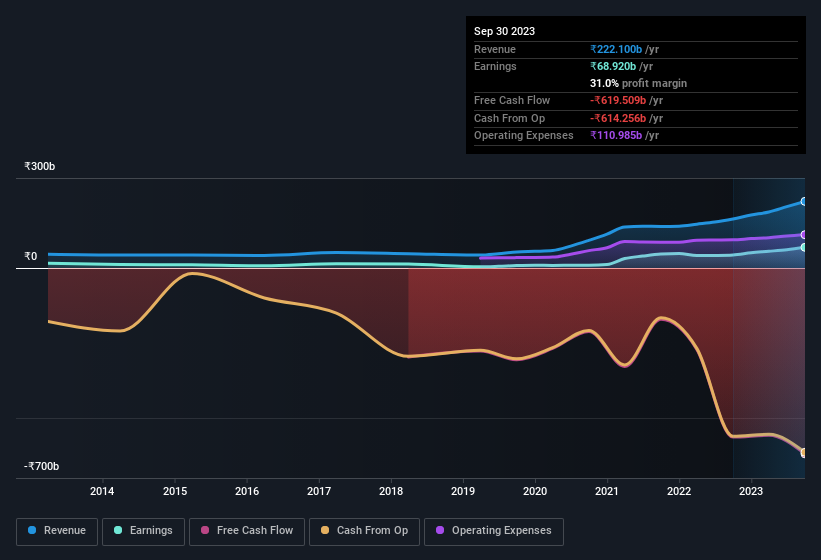We Ran A Stock Scan For Earnings Growth And Indian Bank (NSE:INDIANB) Passed With Ease

For beginners, it can seem like a good idea (and an exciting prospect) to buy a company that tells a good story to investors, even if it currently lacks a track record of revenue and profit. But the reality is that when a company loses money each year, for long enough, its investors will usually take their share of those losses. A loss-making company is yet to prove itself with profit, and eventually the inflow of external capital may dry up.
So if this idea of high risk and high reward doesn't suit, you might be more interested in profitable, growing companies, like Indian Bank (NSE:INDIANB). While profit isn't the sole metric that should be considered when investing, it's worth recognising businesses that can consistently produce it.
See our latest analysis for Indian Bank
Indian Bank's Improving Profits
Over the last three years, Indian Bank has grown earnings per share (EPS) at as impressive rate from a relatively low point, resulting in a three year percentage growth rate that isn't particularly indicative of expected future performance. Thus, it makes sense to focus on more recent growth rates, instead. To the delight of shareholders, Indian Bank's EPS soared from ₹34.96 to ₹51.17, over the last year. That's a commendable gain of 46%.
Top-line growth is a great indicator that growth is sustainable, and combined with a high earnings before interest and taxation (EBIT) margin, it's a great way for a company to maintain a competitive advantage in the market. It's noted that Indian Bank's revenue from operations was lower than its revenue in the last twelve months, so that could distort our analysis of its margins. Indian Bank maintained stable EBIT margins over the last year, all while growing revenue 36% to ₹222b. That's encouraging news for the company!
You can take a look at the company's revenue and earnings growth trend, in the chart below. To see the actual numbers, click on the chart.

Of course the knack is to find stocks that have their best days in the future, not in the past. You could base your opinion on past performance, of course, but you may also want to check this interactive graph of professional analyst EPS forecasts for Indian Bank.
Are Indian Bank Insiders Aligned With All Shareholders?
As a general rule, it's worth considering how much the CEO is paid, since unreasonably high rates could be considered against the interests of shareholders. The median total compensation for CEOs of companies similar in size to Indian Bank, with market caps between ₹333b and ₹998b, is around ₹61m.
The Indian Bank CEO received total compensation of only ₹4.1m in the year to March 2023. This could be considered a token amount, and indicates that the company does not need to use payment to motivate the CEO - that is often a good sign. CEO compensation is hardly the most important aspect of a company to consider, but when it's reasonable, that gives a little more confidence that leadership are looking out for shareholder interests. It can also be a sign of good governance, more generally.
Should You Add Indian Bank To Your Watchlist?
If you believe that share price follows earnings per share you should definitely be delving further into Indian Bank's strong EPS growth. Strong EPS growth is a great look for the company and reasonable CEO compensation sweetens the deal for investors ass it alludes to management being conscious of frivolous spending. So this stock is well worth an addition to your watchlist as it has the potential to provide great value to shareholders. However, before you get too excited we've discovered 2 warning signs for Indian Bank that you should be aware of.
While opting for stocks without growing earnings and absent insider buying can yield results, for investors valuing these key metrics, here is a carefully selected list of companies in IN with promising growth potential and insider confidence.
Please note the insider transactions discussed in this article refer to reportable transactions in the relevant jurisdiction.
New: AI Stock Screener & Alerts
Our new AI Stock Screener scans the market every day to uncover opportunities.
• Dividend Powerhouses (3%+ Yield)
• Undervalued Small Caps with Insider Buying
• High growth Tech and AI Companies
Or build your own from over 50 metrics.
Have feedback on this article? Concerned about the content? Get in touch with us directly. Alternatively, email editorial-team (at) simplywallst.com.
This article by Simply Wall St is general in nature. We provide commentary based on historical data and analyst forecasts only using an unbiased methodology and our articles are not intended to be financial advice. It does not constitute a recommendation to buy or sell any stock, and does not take account of your objectives, or your financial situation. We aim to bring you long-term focused analysis driven by fundamental data. Note that our analysis may not factor in the latest price-sensitive company announcements or qualitative material. Simply Wall St has no position in any stocks mentioned.
About NSEI:INDIANB
Undervalued with solid track record and pays a dividend.


